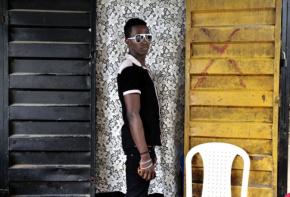Precarious imaging: Visibility surrounding african queerness, Dakar
07 MAY 2014 - 18 JULY 2014 (Opening: Tuesday 6 May, 6:30–8:30pm)
Raw Material Company, Dakar, Senegal
 This act is set within the Dakar Biennale OFF program. In 38 out of 54 African countries homosexuality is illegal. The exhibition, curated by Ato Malinda and Koyo Kouoh, will explore this reality in the work of artists from Algeria, Nigeria, South Africa, Egypt and Kenya respectively: Kader Attia, Andrew Esiebo, Zanele Muholi, Amanda Kerdahi M. and Jim Chuchu.
This act is set within the Dakar Biennale OFF program. In 38 out of 54 African countries homosexuality is illegal. The exhibition, curated by Ato Malinda and Koyo Kouoh, will explore this reality in the work of artists from Algeria, Nigeria, South Africa, Egypt and Kenya respectively: Kader Attia, Andrew Esiebo, Zanele Muholi, Amanda Kerdahi M. and Jim Chuchu.
Except for South Africa all countries have stringent laws against homosexuality, in which same-sex intercourse leads to incarceration. It is the history of activism that with visibility come human rights. But what is to be done when visibility incites violence against the minority? The shared condition of precariousness implies that there will be casualties. There has been evidence of pre-colonial homosexuality, although this is not the primary focus of this exhibition, it is no doubt of interest to many. The exhibition includes photography, video, installation and performance.
Seminar – “Our Bodies: Loving Self, Identity & Personal Liberties” 12–14 May
“Today I believe in the possibility of love; that is why I endeavour to trace its imperfections, its perversions.” Frantz Fanon
Fanon, the father of what is considered postcolonial studies, traces the affects of colonialism not just on the mere physical geography of land and territory but rather, what is considered more damaging, the scares, traces and imprints of colonialism on the geographies of the physical body. Fanon’s statement about love is an invitation to embark on a journey of true liberation from the chains of colonialism to attain personal liberties. True liberation is embracing and loving our bodies and ourselves. “Our Bodies: Loving Self, Identity & Personal Liberties” is a three-day seminar of personal development and enrichment. Building on the primary subject of the exhibition Precarious Imaging through communal dialogue, personal narrative, and interpersonal exercises, we will engage with Fanon’s possibility of love.

